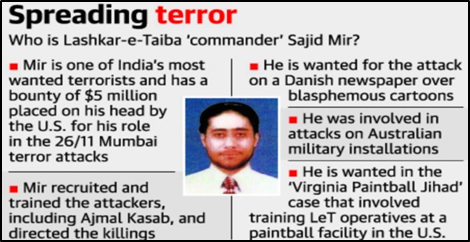In News:
- For the third time in three months, China blocked a joint India-U.S. attempt to put a Pakistan-based terrorist on the UN Security Council’s 1267 list.
- It placed a hold on the proposal to add Lashkar-e-Taiba ‘commander’ Sajid Mir, who is wanted for the 26/11 Mumbai terror attacks.

China’s past record on blocking the proposal at UN

- In August 2022, China had blocked a proposal by India and the US at the UNSC to designate Abdul Rauf Azhar as a global terrorist.
What’s in today’s article:
- Sanctions of the UN Security Council – About, sanctions regime, sanctions committee
- UNSC Al-Qaeda and ISIL Sanctions Committee – About, functions, procedure followed
In Focus: Sanctions of the UN Security Council
- Under Chapter VII of the United Nations Charter, the UN Security Council can take action to maintain or restore international peace and security.
- The application of sanctions is one of the possibilities the Council has in this respect.
- Sanctions measures, under Article 41 of the UN Charter, encompass a broad range of enforcement options that do not involve the use of armed force.
- The measures can range from economic and trade embargoes to more targeted measures against specific individuals, companies or entities, such as the freezing of funds and travel bans.
Sanctions regimes
- Currently, the UNSC has 14 active sanctions regimes which focus on supporting political processes in armed conflicts, nuclear non-proliferation and counter-terrorism.
- Sanctions regimes are enacted via a UN Security Council resolution.
Sanctions committee
- Each sanctions regime is administered by a sanctions committee that consists of all 15 members of the Security Council.
- 15 members include – 5 permanent member and 10 non-permanent members of UNSC.
- These sanctions committees ensure the implementation of the sanctions and can decide by consensus to adopt targeted sanctions against specific individuals, enterprises or entities.
- UNSC Al-Qaeda and ISIL Sanctions Committee or 1267 sanctions committee is one of them.
UNSC Al-Qaeda and ISIL Sanctions Committee
- The ISIL (Da’esh) and Al Qaida sanctions committee is also known as the 1267 sanctions committee.
- It is one of the most important and active UN subsidiary bodies working to combat terrorism, particularly in relation to ISIL (Da’esh), Al‑Qaida and associated individuals, groups, undertakings and entities.
Functions
- Once an entity or an individual is included in the list it gets designated as the “Global Terrorist”.
- The member states are required to:
- freeze funds and financial assets of that individual/entity,
- enforce a travel ban, and
- cut off access to arms and related materials.
Procedure followed by the committee
- Decision by consensus
- The decisions are adopted by consensus.
- This requirement effectively gives a veto to all 15 members of the committee (10 non-permanent + 5 permanent).
- Member can place a hold on the decision
- A committee member can place a “hold” on the decision should they require more time and information to consider the matter at hand.
- As per the guidelines, a hold can last for as long as 6 months at a time, but can be extended further under “extraordinary circumstances”.
- Apart from this vague condition, there is no restriction on repeatedly invoking a hold.
- Meeting behind the close doors
- Committee meetings take place in closed sessions, with no publication of the agenda, proceedings and voting records of the committee.











